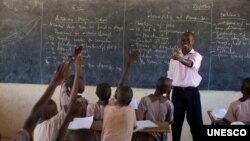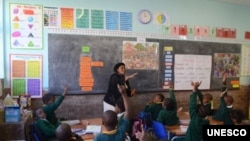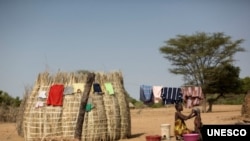In recent years, there’s been a global effort to expand universal access to primary school and provide all children a sound foundation for continuing on to lower secondary school. But a yearly monitoring report by UNESCO’s Education for All effort says governments are losing about $129 billion dollars per a year on poor quality education. As a result, about one in four students in poor countries -- about 175 million young people -- are not able to read a complete sentence.
UNESCO says several factors, including poor teacher training and cutbacks in funding, account for underperforming educational systems.
Education specialist Pauline Rose, the director of the 2013 Global Monitoring Report by UNESCO’s program Education for All, said sub-Saharan Africa would need about 225,000 additional teachers per year to achieve universal primary education by 2015, or nearly 60% of the global total.
Contract teachers
Many governments try to meet the demand by hiring contract teachers, who make up more than half the work force in many West African countries, including Benin, Cameroon, Chad, Mali and Niger.
"The big appeal from the point of view of governments and programs often supported by some donors," she explained, "is that it reduces the wage bill of the government. The teachers are paid a fraction of the cost of civil servant teachers. So, you can hire far more teachers and get more teachers for the same amount of money.
"At the same time, the teachers are not on fixed contracts so there seems to be advantages of having teachers that can be [dismissed] if at a later stage you don’t need so many or they are underperforming.
Rose said there's other issues revolving around low pay and poor teaching conditions: motivation.
"This is an important profession, she said, "and they need to be motivated to teach children well, to be in a classroom rather than doing other jobs, and this is one of the problems of recruiting teachers on these types of contracts.
Improved teacher recruitment
The report says teachers should come from a variety of backgrounds and geographical areas. Candidates should receive improved training, including mentoring and adequate classroom experience. It says pay should also be raised to meet the teachers’ basic needs, a step which could lead to recruiting them as civil servants. Governments could also offer incentives like good housing or bonuses to ensure teachers are allocated to disadvantaged areas.
Malawi is working with an international NGO to establish teacher colleges that train new candidates in skills for rural areas. Ethiopia encourages mentor and supervisors to help support new candidates. A project in South Sudan aims to increase the number of female teachers by providing financial support to women candidates. It’s also providing incentives to help over four thousand girls complete secondary school and potentially become teachers.
Organizing priorities
The report mentions other ways to improve education.
Governments can reallocate how they spend their education funds. For example, the report found that most educational resources in Malawi support the most educated 10 percent.
On the other hand, South Africa allocates six times more to students in areas with low incomes and education levels and high unemployment.
The Education for All report says government will also need to increase spending. In many countries, financial support for education has waned or remained static.
The report says sub-Saharan Africa will need four billion dollars annually to pay the salaries of the additional primary school teachers required by 2020. It also says the region will need another $26 billion per year to achieve universal primary education.
UNESCO encourages governments to devote about 20% of their national budgets and six percent of their gross domestic product to education.
The report says Angola has earned a great deal of money from lucrative natural resources for budget revenues but spends only nine percent of its budget on education, one of the lowest amounts in the world.
And it found that some countries – including Bangladesh, Democratic Republic of the Congo and Pakistan – allocate well under six percent of their GDP on education. It says in Pakistan, agriculture contributes more than 20 percent to the overall economy but contributes just over one percent in tax revenues to education.
Raising funds
The report offers suggestions for raising the additional funds.
"The problem with government is that it’s not spending enough on education," said Rose. "Some are spending up to 20 percent of their budget on education but the problem is that they are not raising enough in taxation. We suggest there are ways to increase the tax base because there are weak approaches to collecting taxes…. It’s too easy for elites to avoid paying taxes. [Governments] need to tighten loopholes.
According to the report, tax loopholes and corrupt practices deprive African governments of over $60 billion per year. UNESCO studied 67 countries that provided available data, and found they could increase funding for education by $153 billion dollars by diversifying their tax base. The report notes that the Democratic Republic of the Congo lost more than one billion dollars in mining deals in a three-year period -- money that could have funded the education budget for nearly two years.
Education pays off
UNESCO says the advantages of education are many: an average one-year increase in education spending can boost a country’s economy by over two percent – and help people escape from poverty.
In Tanzania, more than 80% of workers with less than a primary education are living below the poverty line. UNESCO says by contrast, workers with a primary education are 20% less likely to be poor, and those with a secondary education reduced their chances by three times as much. In Pakistan, those who can read and write earn 20% more than those who cannot. UNESCO says literate farmers are more likely to use new techniques and technologies, and educated mothers make better decisions regarding family health.
Next year, the ambitious global effort to raise living standards, the UN Development Goals, comes to an end.
UNESCO says the framework that replaces them should include among its top goals the right to a quality education -- free and compulsory – for everyone.
UNESCO says several factors, including poor teacher training and cutbacks in funding, account for underperforming educational systems.
Education specialist Pauline Rose, the director of the 2013 Global Monitoring Report by UNESCO’s program Education for All, said sub-Saharan Africa would need about 225,000 additional teachers per year to achieve universal primary education by 2015, or nearly 60% of the global total.
Contract teachers
Many governments try to meet the demand by hiring contract teachers, who make up more than half the work force in many West African countries, including Benin, Cameroon, Chad, Mali and Niger.
"The big appeal from the point of view of governments and programs often supported by some donors," she explained, "is that it reduces the wage bill of the government. The teachers are paid a fraction of the cost of civil servant teachers. So, you can hire far more teachers and get more teachers for the same amount of money.
"At the same time, the teachers are not on fixed contracts so there seems to be advantages of having teachers that can be [dismissed] if at a later stage you don’t need so many or they are underperforming.
Rose said there's other issues revolving around low pay and poor teaching conditions: motivation.
"This is an important profession, she said, "and they need to be motivated to teach children well, to be in a classroom rather than doing other jobs, and this is one of the problems of recruiting teachers on these types of contracts.
Improved teacher recruitment
The report says teachers should come from a variety of backgrounds and geographical areas. Candidates should receive improved training, including mentoring and adequate classroom experience. It says pay should also be raised to meet the teachers’ basic needs, a step which could lead to recruiting them as civil servants. Governments could also offer incentives like good housing or bonuses to ensure teachers are allocated to disadvantaged areas.
Malawi is working with an international NGO to establish teacher colleges that train new candidates in skills for rural areas. Ethiopia encourages mentor and supervisors to help support new candidates. A project in South Sudan aims to increase the number of female teachers by providing financial support to women candidates. It’s also providing incentives to help over four thousand girls complete secondary school and potentially become teachers.
Organizing priorities
The report mentions other ways to improve education.
Governments can reallocate how they spend their education funds. For example, the report found that most educational resources in Malawi support the most educated 10 percent.
On the other hand, South Africa allocates six times more to students in areas with low incomes and education levels and high unemployment.
The Education for All report says government will also need to increase spending. In many countries, financial support for education has waned or remained static.
The report says sub-Saharan Africa will need four billion dollars annually to pay the salaries of the additional primary school teachers required by 2020. It also says the region will need another $26 billion per year to achieve universal primary education.
UNESCO encourages governments to devote about 20% of their national budgets and six percent of their gross domestic product to education.
The report says Angola has earned a great deal of money from lucrative natural resources for budget revenues but spends only nine percent of its budget on education, one of the lowest amounts in the world.
And it found that some countries – including Bangladesh, Democratic Republic of the Congo and Pakistan – allocate well under six percent of their GDP on education. It says in Pakistan, agriculture contributes more than 20 percent to the overall economy but contributes just over one percent in tax revenues to education.
Raising funds
The report offers suggestions for raising the additional funds.
"The problem with government is that it’s not spending enough on education," said Rose. "Some are spending up to 20 percent of their budget on education but the problem is that they are not raising enough in taxation. We suggest there are ways to increase the tax base because there are weak approaches to collecting taxes…. It’s too easy for elites to avoid paying taxes. [Governments] need to tighten loopholes.
According to the report, tax loopholes and corrupt practices deprive African governments of over $60 billion per year. UNESCO studied 67 countries that provided available data, and found they could increase funding for education by $153 billion dollars by diversifying their tax base. The report notes that the Democratic Republic of the Congo lost more than one billion dollars in mining deals in a three-year period -- money that could have funded the education budget for nearly two years.
Education pays off
UNESCO says the advantages of education are many: an average one-year increase in education spending can boost a country’s economy by over two percent – and help people escape from poverty.
In Tanzania, more than 80% of workers with less than a primary education are living below the poverty line. UNESCO says by contrast, workers with a primary education are 20% less likely to be poor, and those with a secondary education reduced their chances by three times as much. In Pakistan, those who can read and write earn 20% more than those who cannot. UNESCO says literate farmers are more likely to use new techniques and technologies, and educated mothers make better decisions regarding family health.
Next year, the ambitious global effort to raise living standards, the UN Development Goals, comes to an end.
UNESCO says the framework that replaces them should include among its top goals the right to a quality education -- free and compulsory – for everyone.







